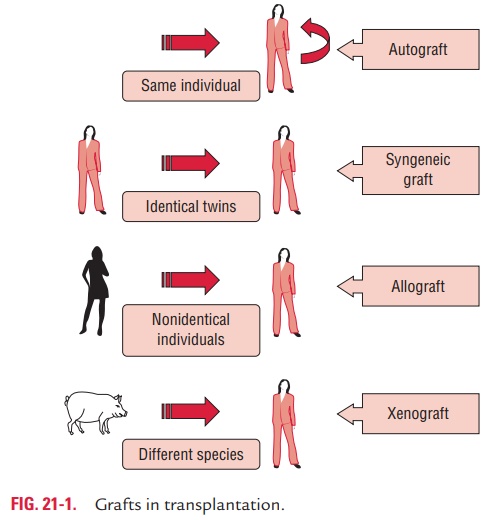Chapter: Microbiology and Immunology: Immunology of Transplantation and Malignancy
Transplant Immunology and Types of Transplants
Transplant Immunology
Transplantation can be defined as the transfer of cells, tissues, or organs from one site in an individual to another, or between two individuals. In the latter case, the individual who provides the transplant organ is termed a donor and the individual receiving the transplant is known as the recipient.
Types of Transplants
There are four different basic types of transplants. These reflect the genetic relationship of the donor to the recipient. The degree of immune response to a graft varies with the type of graft (Fig. 21-1).

I. Autograft:
An autograft is the transfer of individual’s own tissue or organ from one site to another site in the body. In other words, the recipient is also the donor. Com- mon examples of autografts include skin transplants in burn patients and bypass surgery in patients suffering from coronary heart disease.
II. Syngraft:
A syngraft is a transfer of tissue between two genetically identical individuals, i.e., identical twins. The first successful human kidney transplant was a syngraft,
III. Allograft:
An allograft is the transfer of tissue or an organbetween genetically different members of the same species, i.e., from one human to another. This is the predominant form of transplantation today, and allografts have domi-nated transplant research for many years.
IV. Xenograft:
A xenograft is the transfer of tissues or organsbetween members of different species. It represents the most disparate of genetic relationships and is always rejected by an immunocompetent recipient.
A major limitation in the success of transplantation is the immune response of the recipient to the donor tissue. Problem of rejection with autografts is usually minimal or absent. It is only when tissues from ”others” are used, as in allografts and xenografts, the problem of rejection arises.
Transplantation immunology is the study of the events thatoccur after an allograft or a xenograft is removed from a donor and then transplanted into a recipient.
Related Topics